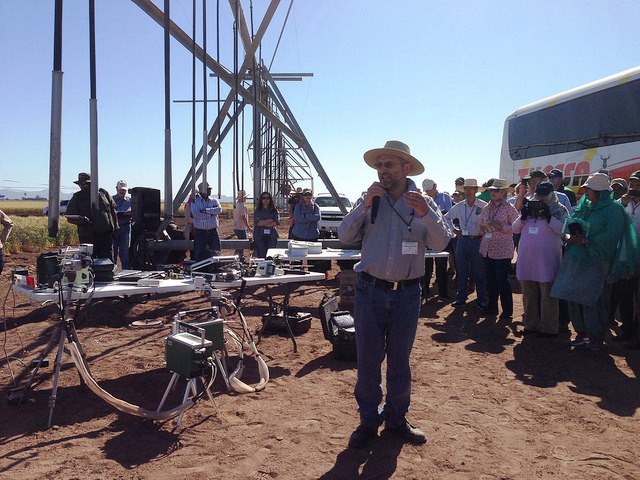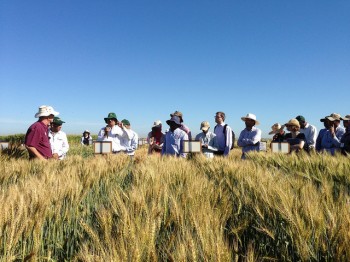
EL BATAN, Mexico (CIMMYT) – Scientists involved in a major global initiative aimed at increasing wheat yields as much as 60 percent by 2050 got a recent boost when the U.S. government announced $3.4 million in new research funds.
Researchers affiliated with the International Wheat Yield Partnership (IWYP), focused on developing new high-yielding varieties of wheat to meet demand that will be generated by a projected 33 percent increase in population growth from 7.3 billion people today to 9.5 billion by 2050, will be eligible to apply for the grant money.
“This opens up new opportunities for scientists in the United States to provide invaluable input to the overall project of increasing yields, improving our potential to tackle this vital work to achieve global food security,” said Matthew Reynolds, wheat physiologist at the Mexico-based International Maize and Wheat Improvement Center (CIMMYT), one of the founding members of IWYP.
Awards for the new funds announced last Monday by Tom Vilsack, the U.S. agriculture secretary, will be made available through the U.S. Department of Agriculture National Institute of Food and Agriculture (NIFA) Agriculture and Food Research Initiative (AFRI).
“Wheat is one of the world’s most important staple crops, providing a significant amount of daily calories and protein throughout the world,” Vilsack said.
“By 2050, the demand for wheat as part of a reliable, affordable, and nutritious diet will grow alongside the world population, and continued wheat research will play an important role in ensuring its continued availability.”
IWYP, which targets partner investments of up to $100 million, supports the G20 Wheat Initiative in its efforts to enhance the genetic component of wheat yield and develop new wheat varieties adaptable to different geographical regions and environments.
CLIMATE RISKS
Wheat yields face threats from global warming. Findings in a report from the Intergovernmental Panel on Climate Change (IPCC) state that it is very likely that heat waves will occur more often and last longer throughout the 21st century and rainfall will be more unpredictable.
Mean surface temperatures could potentially rise by between 2 to 5 degrees Celsius or more, the report said.
“Wheat currently provides 20 percent of calories and protein consumed worldwide and current models show that a 2 degree increase in temperature would lead to 20 percent reduction in wheat yield and that a 6 degree increase would lead to a 60 percent reduction,” Reynolds said.
“If we have a 40 percent yield reduction due to climate change, the risks to food security will be increased because wheat production has to increase by 60 percent just to keep up with population projections.”
In addition to CIMMYT, IWYP members include Britain’s Biotechnology and Biological Sciences Research Council (BBSRC), Mexico’s Secretariat of Agriculture, Livestock, Rural Development, Fisheries and Food (SAGARPA), the U.S. Agency for International Development (USAID), the Grains Research and Development Corporation of Australia (GRDC), the Department of Biotechnology of India (DBT), Agriculture and Agri-Food Canada (AAFC), the Institut National de la Recherche Agronomique (INRA) in France and the Syngenta Foundation for Sustainable Agriculture (SFSA) in Switzerland.
Applications are due May 3, 2016 and more information is available via the NIFA-IWYP request for applications.

 Climate adaptation and mitigation
Climate adaptation and mitigation 